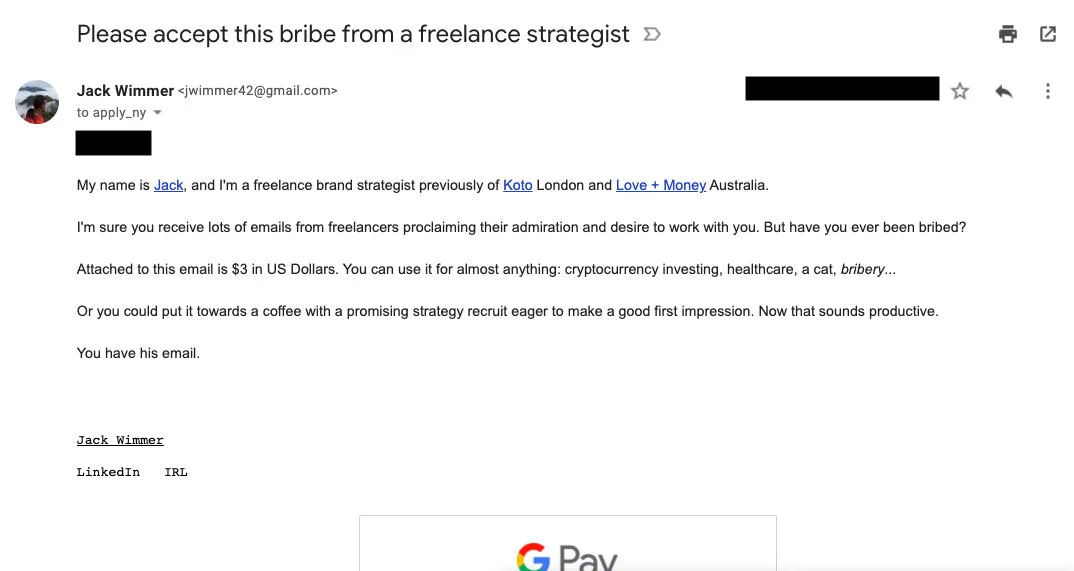Getting an agency’s attention
Throughout our schooling, most of us were taught three common sense steps to getting a job:
Look for job openings
Apply if you meet the requirements
Be polite and professional
But you’re not trying to become the nurse or firefighter you thought you wanted to be in eighth grade. No, you’re trying to work at a top-tier creative agency. Which means it’s critical that you ignore the three-step death trap and read this article. Let’s break it down.
© Illustration by Jared McDowell
First, look for job openings
If you’re only applying for agency jobs posted online, prepare for a slow road ahead. For starters, most jobs never even make it online. They exist only in conversations, internal Slack groups, and email threads with recruiters. When you are able to find them, there’s a decent chance they’re just being used to gauge the level of talent the agency could attract, or to give the appearance that they’re growing. It’s shitty, but it happens.
Lucky for you, jobs within creative agencies can be whipped up from scratch.
Unlike the industries we all hear about in school, the job roles within agencies are constantly in flux. There is no template. Agencies actually take great pride in being flexible and adaptive, and are often open to creating new roles. This is especially true of small teams.
In fact, my first three full-time gigs following university didn’t even exist until I stepped into them. When I met with my would-be first employer, a small market research firm, they didn’t have a job for me per se, but eventually hired me under the banner of junior strategist. My job was made up on the fly. I then joined a little branding studio in Australia off the back of an email chain, and spent a year without having a single conversation about my title. After that I became the first strategist hired at a growing advertising agency in the U.S., where I was later asked to write my own job description. Each time I managed to fill an opening that didn’t technically exist. For this to happen three times in a row is a bit weird, but not unheard of.
When young job seekers ask me for advice (lol they don’t), I tell them (in spirit) not just to look for openings to apply for, but rather to decide who they want to work for, then mercilessly get up in their inbox.
This counterintuitive approach works primarily through attention and flattery. When you submit a job application in response to a posted opening, you’re choosing to compete in a crowded space. Even if your information and love letters are read, the assumption will be that you’re doing the same thing with other agencies, which will make your expression of interest feel less special. Send a compelling email out of the blue though, and it will land in a quiet inbox. Your interest will be taken as genuine, egos will be stroked, and they might just find room for you.
Agency first, opportunity second.
Above: An email I sent to a small design studio who by all indications weren’t hiring. A few days later I received a response saying they might be open to creating a new position, which led to a longer conversation about what my role could look like.
Second, apply if you meet the requirements
Following this rule of the road has a fundamental flaw: it assumes that agencies actually know what they’re looking for. Those long lists of qualifications and responsibilities for intern, junior and mid-weight roles? That’s usually just the agency trying to look legit and signal high expectations. In reality they would never expect anyone to check every box, aren’t exactly sure what they’re looking for, and could be swayed by someone charming who shows potential.
Now, I wouldn’t encourage anyone to apply for a job that they’re completely unqualified for. If you’re fresh out of school, don’t go wasting people’s time trying to become the next creative director at Mythology, but if you’re early in your career you should be aiming higher than you think you deserve. Because if you’re anything like I was, you’re going to look at agencies from the outside and give them too much credit. To you they’ll look like well-oiled machines packed with flawless experts, but in reality they’re probably less out of your league than you think.
I love this quote from Michelle Obama during a conversation about imposter syndrome: “I have been at probably every powerful table that you can think of, I have worked at nonprofits, I have been at foundations, I have worked in corporations, served on corporate boards, I have been at G-summits, I have sat in at the UN; they are not that smart.” Same goes for the leadership at that agency you’re drooling about.
Don’t be intimidated by this call to action to aim high. These early years of low expectations and constant confusion feel roughly the same no matter where you’re working, so it’s better to spend them somewhere that’ll keep doors open.
Above: An email to a New York branding agency in response to a director-level job posting. I wasn’t willing to work full-time or move to New York, nor did I have the length of experience they were looking for. But it was well worth a shot. Full disclosure: I’m 0/3 bribing agencies with Google Pay.
Third, be polite and professional
OK, admittedly this one doesn’t apply to every personality or agency -- always be true to yourself and read the room -- but the realities of landing a top-tier agency job demand that you approach your communication with at least a sprinkle of carelessness. If you’re making a written introduction, especially if it’s to a public email address, it’s essential that you behave as though that inbox gets 1,000 messages a day.
In my job hunting experience, rational arguments rarely work in this environment. Clearly promoting your qualifications, listing your skills and asking nice questions only puts you in the most crowded category of job seekers. The person on the other end of the screen has read a thousand variations of that same email. Save the formality for your Procter & Gamble application -- this is an agency. This is a team of people whose job it is to authentically cut through noise, and who get paid to connect with people in meaningful ways. “To whom it may concern, I hope this email finds you well” ain’t that.
Consider: Is there something about you that your gut says to bury? Try bringing it to the surface. From a rural American town trying to work in Berlin? Use “y’all” liberally. Outdoorsy but applying somewhere formal and buttoned-up? Reset your email profile picture to one of you on a mountain. Don’t understand what the agency does? Admit it.
Above: An email to a London design studio that the founder “shared with the whole team,” which earned me an in-person interview for a position that didn’t exist.
In a climate of overloaded inboxes and exhausting pleasantries, ambitious job seekers in this industry simply can’t afford to be gentle swans who play by the rules. Send a polite, cookie-cutter email to careers@agency.co about a job that you’re clearly qualified for and prepare for either radio silence or a position that doesn’t reflect your potential.
Consider this permission to take a risk and send some stupid fucking emails. BCC me.
About the author
I'm a senior brand strategist currently working with branding studios in Australia, for clients throughout Asia, mostly from the Greek island of Samos. When people hear my American accent, they get very confused.





